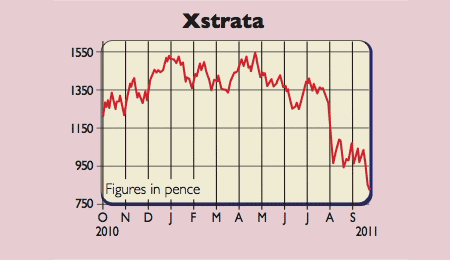
Commodities appear poised for another sharp retreat. Last week, Tom Albanese, Rio Tinto’s chief executive, said markets were weaker and that customers were asking to delay metals shipments. The International Monetary Fund echoed his view, downgrading its outlook on a basket of basic materials. But there’s no need to man the life boats just yet. There’s some decent money still to be made in mining.
Take the world’s fourth-largest miner, Xstrata. Its share price has fallen 40% since April, even though prices for its coal (representing 27% of earnings before interest, tax, depreciation and amortisation – EBITDA) have held up quite well. And despite the recent declines, Xstrata’s other main outputs – copper (44%), zinc (13%), nickel (13%) and alloys (3%) – still sell for well above marginal production cost. The balance sheet has greatly improved too, with the dividend forecast to leap 36% this year on the back of solid cash generation.
Chief executive Mick Davis is upbeat about demand from China, saying in August that “there is little sign so far of a hard landing. In the underdeveloped central and western provinces, more than $100bn of new infrastructure projects were approved in 2010, and will require substantial volumes of imported commodities as construction begins.” Of course, if there is a total collapse in orders from emerging nations – which I feel is unlikely – there will be further downside. But if this happens, it wouldn’t take long before supply wilted too, which could see commodity prices snap back.
Xstrata (LSE: XTA), rated OUTPERFORM by Credit Suisse
Assuming the global economy does not drop off a cliff, Xstrata has some outstanding assets to exploit. Davis believes these should enable the group to expand volumes by 50% over the next three years. That’s not to say there aren’t hurdles looming in the second half of the year, when Xstrata typically makes about 60% of its profit. Cost pressures and resource nationalism are rising across the world. Strikes in Chile and South Africa have pushed up labour rates, while there have been corporation tax-rate hikes in places such as Peru and Australia. Meanwhile, electricity costs in its South African smelters have risen by a fifth.
I value Xstrata on a through-cycle EBITDA multiple of six. After deducting net debt of $8.1bn and a $0.7bn pension deficit, that gives a value of more than £12 a share. The next trading statement is scheduled for 18 October. Credit Suisse has a £20 target price on the stock.
Rating: BUY at £9.00